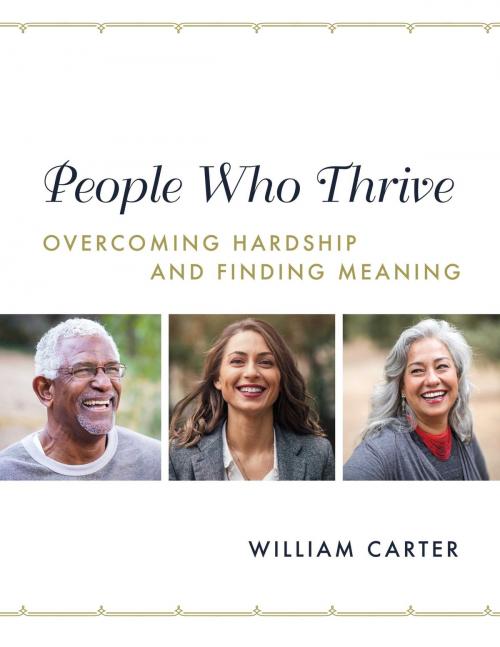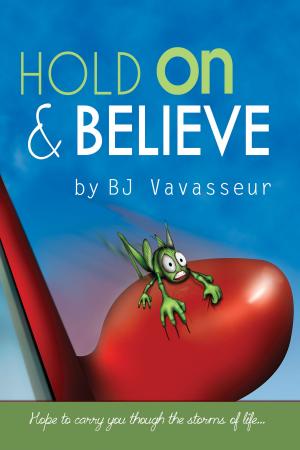People Who Thrive
Overcoming Hardship and Finding Meaning
Nonfiction, Health & Well Being, Self Help, Mental Health, Happiness| Author: | William Carter | ISBN: | 9781543948554 |
| Publisher: | BookBaby | Publication: | September 30, 2018 |
| Imprint: | BookBaby | Language: | English |
| Author: | William Carter |
| ISBN: | 9781543948554 |
| Publisher: | BookBaby |
| Publication: | September 30, 2018 |
| Imprint: | BookBaby |
| Language: | English |
Though all people experience varied types and degrees of adversity, an ingrained belief across cultures is that life is meant to be meaningful. When hardship strikes, people search for ways to respond, rebuild, prevail. If it is true that life is meaningful, then hardship, adversity, trauma, grief, wounds, and emotional pain are roadblocks to that end goal. Not insurmountable barriers, but obstacles that can be overcome. Thriving—overcoming hardship—is a learned experience. People who thrive are intentional. They purposely get to know themselves, build support systems, make effective use of emotions, live within hope, and know what it means to love. Finding meaning, thriving is, in some ways, cloaked in mystery. If people can thrive, indeed are meant to thrive, there must be a pathway to that endpoint. People Who Thrive provides a research-based model for successfully coping with life's struggles, and simultaneously teaches thinking, communication, and relationship skills to make people vibrant. Concepts, learning points, and skill-building exercises will draw from cognitive psychology, attachment theory, the positive psychology movement, humanism (self-growth), and posttraumatic growth research. Two key points underlie the book's message: 1. All people can find meaning in life, no matter the tragedies and troubles encountered along the way. Thriving is not an end result achieved by a few. All people can find a path to growth in spite of, and sometimes because of, hardship. 2. Thriving is a learned skill. Several cognitions (beliefs) are firmly emphasized throughout the book: No matter the form or strength hardship takes, recovery and growth are possible. No matter the twists and turns of Life's trek, nothing can reduce a person's worth and value. Helplessness can be replaced with hope. If life is indeed meant to be meaningful, there must be a reasonable way to find or create meaning. A user-friendly writing style figuratively draws the reader into the psychologist's office. The book's format lends itself to individual reading or group study in mental health or community organizations. The book makes abundant use of lists, tables, examples, reflective exercises, and illustrations to make concepts understandable and personally applicable. Readers will simultaneously gain knowledge and experience therapeutic growth.
Though all people experience varied types and degrees of adversity, an ingrained belief across cultures is that life is meant to be meaningful. When hardship strikes, people search for ways to respond, rebuild, prevail. If it is true that life is meaningful, then hardship, adversity, trauma, grief, wounds, and emotional pain are roadblocks to that end goal. Not insurmountable barriers, but obstacles that can be overcome. Thriving—overcoming hardship—is a learned experience. People who thrive are intentional. They purposely get to know themselves, build support systems, make effective use of emotions, live within hope, and know what it means to love. Finding meaning, thriving is, in some ways, cloaked in mystery. If people can thrive, indeed are meant to thrive, there must be a pathway to that endpoint. People Who Thrive provides a research-based model for successfully coping with life's struggles, and simultaneously teaches thinking, communication, and relationship skills to make people vibrant. Concepts, learning points, and skill-building exercises will draw from cognitive psychology, attachment theory, the positive psychology movement, humanism (self-growth), and posttraumatic growth research. Two key points underlie the book's message: 1. All people can find meaning in life, no matter the tragedies and troubles encountered along the way. Thriving is not an end result achieved by a few. All people can find a path to growth in spite of, and sometimes because of, hardship. 2. Thriving is a learned skill. Several cognitions (beliefs) are firmly emphasized throughout the book: No matter the form or strength hardship takes, recovery and growth are possible. No matter the twists and turns of Life's trek, nothing can reduce a person's worth and value. Helplessness can be replaced with hope. If life is indeed meant to be meaningful, there must be a reasonable way to find or create meaning. A user-friendly writing style figuratively draws the reader into the psychologist's office. The book's format lends itself to individual reading or group study in mental health or community organizations. The book makes abundant use of lists, tables, examples, reflective exercises, and illustrations to make concepts understandable and personally applicable. Readers will simultaneously gain knowledge and experience therapeutic growth.















